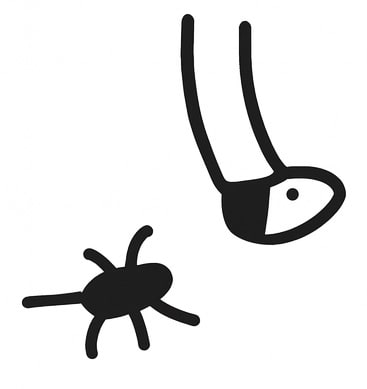Published on August 29, 2025 10:08 AM GMT
I let a tooth rot for over a year. It was my upper right second molar, the one just before the wisdom tooth. Every time I ate something hard, like a peanut, it would wedge into the decay and shoot a spike of pain through my upper jaw. I was lazy, so I ignored it until it got worse.
And then it did.
One afternoon in June, a truly terrible toothache set in. Before I could get an emergency dental appointment, I found myself standing in the shower, letting hot water run over my head to dull the pain. Afterwards, I planted my face into a cuddle bear on the sofa. I’d been told that swearing out loud helps, so I swore, muffled, into the bear. The neighbours must have been distressed.
After the temporary root canal, once the pain had eased, my mind drifted to insects. Maybe I’m the first person to leave a dentist’s chair thinking about them. ‘Should I stop walking on grass so I don’t crush bugs under my foot?’
It’s impossible to know where thoughts come from, but if I had to guess, this one may trace back to a man I’d had dinner with the week before. He works on insect welfare, trying to improve the practices around farming them. He ate his food, spiders and flies inked on his arm, talking about his work. I remember thinking, ‘Wow, it’s cool that you’re willing to take on these weird, neglected problems.’
With the right side of my face still numb, on my walk back from the dentist, I began reflecting on my own treatment of insects. As a kid, I was terrified of cockroaches. They were ugly, alien things that gave me the creeps, and I’d call for my mother to kill any I saw in the bathroom. Later, at university, the fear transferred to spiders, which I would unceremoniously hoover up. My gut reaction was disgust, curdling into fear as I approached to end them. Killing them brought a sense of joy and relief. And yet, I was still ending a creature that could feel pain. Over time, I realised I ought to change how I treat these beings.
Cockroaches are mostly a rarity in my life (the British winter has its upsides). If I see a spider, I either leave it be or, if my hand is forced, I fetch a glass and a coaster. I gently nudge it into the vessel, open a window, and set it free. But wait. By putting it outside, am I really doing it a favour? Inside, it’s warm and safe from predators. Outside, its end will surely come sooner, and perhaps more brutally.
As I’ve grown older, I’ve tried to live more in line with my principles. Through all the philosophising, I feel I now have a better lay of the land. Many ideas and values have taken root and withered, but perhaps at my core I’ve become more utilitarian. There is a deep concern about reducing harm. I try to live by it, though it’s obvious how often I fail. I am vegan, but I consume soybeans that contribute to the destruction of forests. I cycle, but I inevitably kill bugs on the way.
Robbie told me about an organised bike tour he did around the north of Scotland. It was a popular event, with hundreds of cyclists on the route. As he rode, he saw the road. Littered with the bodies of frogs, flattened by the cyclists ahead of him.
Do you blame the cyclists? Do you blame the frogs? Is it just the fate of the universe? One group of frogs dies, and a new one hatches.
Sometimes a car will hit a deer. Sometimes a plane will collide with birds. Sometimes you’ll scratch your face and kill an insect.
It is hard to know where to draw a reasonable line. You might expect a driver to swerve to avoid a deer. But a plane can’t avoid a flock of birds. An insect might die under your hand, and you would never know.
The intensity of it all is too much to take on. To feel the weight of the world, and all its pain, is perhaps an easy way to wallow and drown, rather than to do anything about it. So you try your best. And everyone’s best is different.
But you have to try.
And I’m going to start by trying not to step on the bugs.

Discuss

